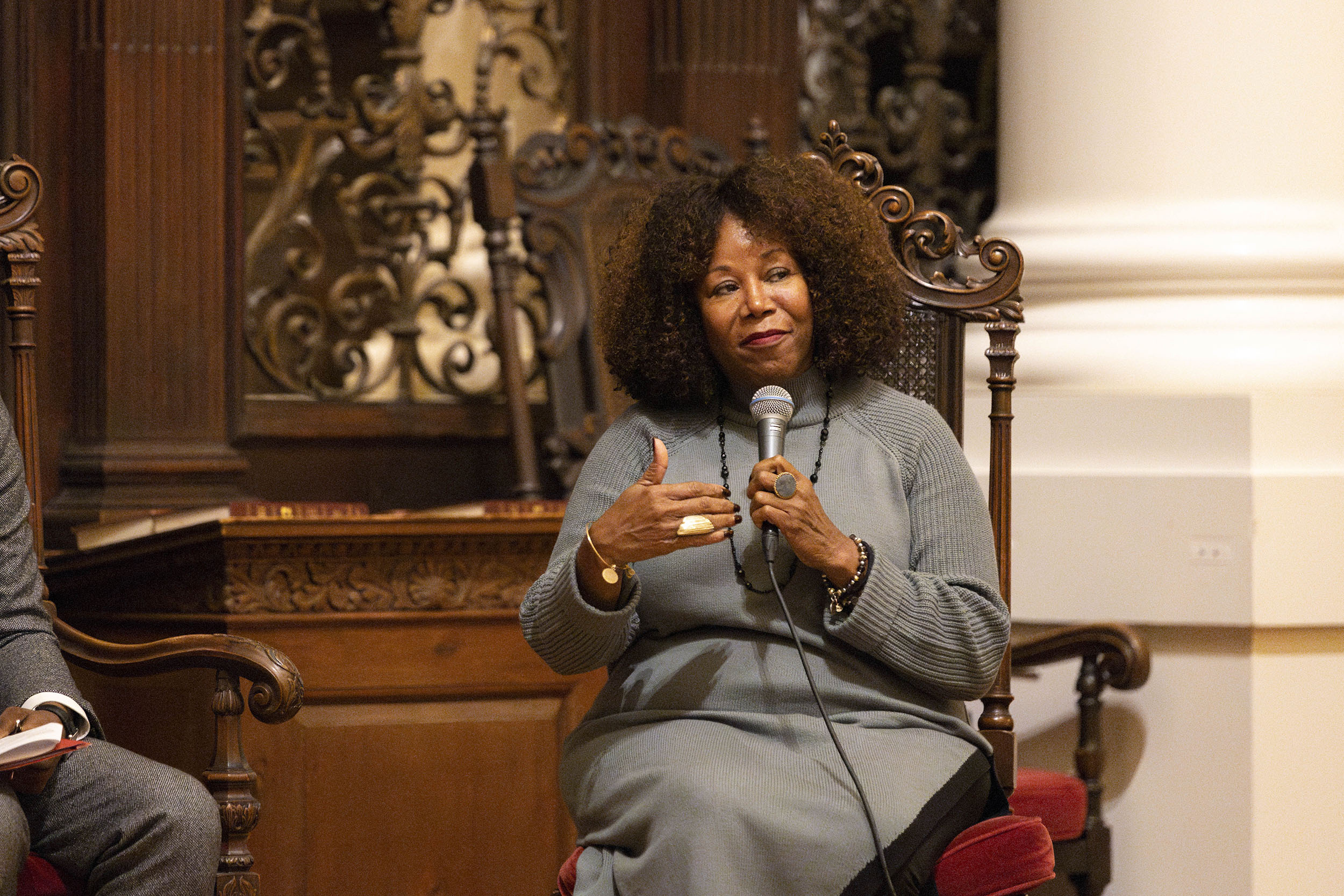
“It is us adults, we have kept racism alive, and we pass it on to the next generation,” Ruby Bridges told the Memorial Church audience.
Niles Singer/Harvard Staff Photographer
An honor named for her best friend and mentor
Ruby Bridges receives Robert Coles Call of Service award for work educating others about tolerance
When Ruby Bridges was 6 years old, she came to view Robert Coles as her “own best friend.”
It was 1960, and Bridges was the first African American child to integrate the formerly whites-only William Frantz Elementary School in New Orleans. Her school year was marked by upheaval as she was met by an angry, racist mob. Federal marshals escorted her into the classroom where she was the only student after parents withdrew their white children in protest. Bridges found some solace when Coles, a child psychiatrist who would later become a Harvard professor, would visit her family’s house and they would sit together at the kitchen table drawing pictures.
“Dr. Coles reached across the aisle to come work with me, being 6 years old and going through that and not really being able to talk about it,” Bridges told a packed crowd at Harvard Memorial Church last week, where she was honored with the Phillips Brooks House Association Call of Service award that bears Coles’ name. “The conversations we had together definitely had to have had some impact on me.”
Bridges, now 69, is an activist, author, and the founder of The Ruby Bridges Foundation, which promotes tolerance through education. The award is named in honor of Coles, now a Harvard professor emeritus, Civil Rights activist, and Pulitzer Prize-winning author of the series “Children of Crisis.”
“This fight that we’re in is much, much bigger than the color of our skin, and that’s why all of us are suffering today.”
Ruby Bridges
In a conversation with Brandon Terry, the John L. Loeb Associate Professor of the Social Sciences, and Hiren Lami ’24, and Elizabeth Ogolo ’24, president and vice president of PBHA, Bridges spoke about feeling a “calling” to public service and educating others about tolerance, a call that she believes comes from the child who faced down that mob.
“Every one of our babies comes into the world with a clean heart and a fresh start in life. It is us adults, we have kept racism alive, and we pass it on to the next generation,” Bridges said. “That 6-year-old [in me] kept saying, ‘Talk to the 6-year-olds.’ So that’s what I started to do.”
Bridges framed the fight for equal rights as a fight between good and evil.
“We’re still picking and choosing, and not judging each other by the content of our character. If we don’t stop that, we are going to lose this fight,” Bridges said. “This fight that we’re in is much, much bigger than the color of our skin, and that’s why all of us are suffering today.”
In recent years, Bridges’ children’s books — including “This Is Your Time” and “Ruby Bridges Goes to School” — have been named in book bans and challenges in U.S. schools, something Bridges believes is because they are so widely used to educate students about Civil Rights.
“I was told that my books are being banned because my books make young people feel bad about who they are,” she said. “I know that’s not true, there’s too many young people all across this country who so connected with my story.”
Bridges spoke about the importance of representation in books, recalling that when she returned to school the year after her infamous 1960 walk, she was excited to begin studying history, hoping to get some context about what happened to her. It never came.
“The textbooks that I was using said nothing about my own history. I didn’t see anyone in those books that looked like me. How was I to learn about me?” Bridges said. “If we’re going to have a conversation about banning books, let’s have that conversation. It is high time that we change the books that we are forcing our young people to study and to learn from, so that all of us Americans are represented.”
During her visit to Cambridge, Bridges met with a group of elementary-school-age children from the Phillips Brooks House Association’s Afterschool and Mentoring programs. The children asked her many questions, including whether she was scared during that now-famous walk into school. Bridges replied that she wasn’t, that she was too young to understand what was happening — she assumed the yelling crowd was a Mardi Gras celebration. It wasn’t until later in the year, after some interactions with her classmates, that she began to piece together the situation.
Another child asked about Bridges’ hopes for the future.
“That we will get to that better place where grown-ups are not fighting amongst themselves,” Bridges said.
At Memorial Church, Bridges said the advice she would offer children is to enjoy being young and not worry too much, because the world is going to get better.
“Continue to dream, always be hopeful, and always know that you have nothing to worry about,” Bridges said. “That 6-year-old did a lot of worrying. If I could speak to that 6-year-old again, I would say, ‘Ruby, it’s OK. Things are going to be OK.’ And that’s what I want other people to know.”




